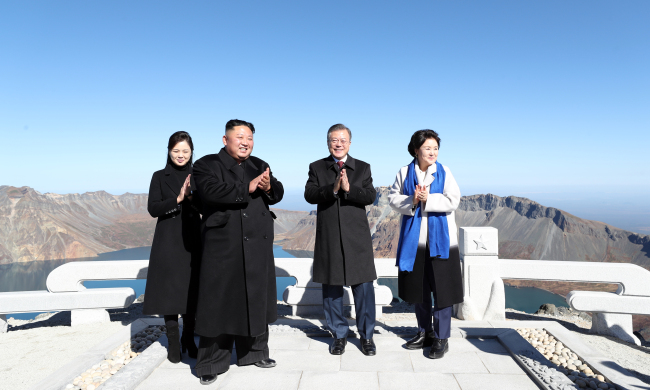[Newsmaker] Kim Jong-un’s visit to Seoul: What it means for two Koreas and beyond
Experts say Kim’s trip to Seoul is a risky bet, but one worth taking to promote his image as the leader of a ‘normal state’
By Yeo Jun-sukPublished : Sept. 20, 2018 - 17:36
With North Korean leader Kim Jong-un pledging to visit Seoul within the year, there is a mix of hope and caution in the air over the first-ever trip to the South by the top leader from the North.
At a joint conference with President Moon Jae-in in Pyongyang on Wednesday, Kim said he had promised Moon that he would visit Seoul “in the near future.” Moon said he expected Kim to come to South Korea’s capital before the end of the year.
The announcement came as surprise to South Koreans, who have never seen the North Korean leaders crossing into the South Korean territory after the 1950-53 Korean War divided the Korean Peninsula.
“I never imagined that I would see a North Korean leader come here,” said Kim Yeong-suk, 62, who lost his father during the Korean War. “I simply can’t believe it right now. It’s just surreal.”

It is still unclear what prompted the North Korean leader to take the risk of visiting the capital of South Korea, where the memory of the Korean War and previous military provocations are etched in the memories of many.
On Thursday, a group of conservative activists and war veterans protested Kim’s planned visit to Seoul outside the Dongdaemun Design Plaza in Seoul, where a press center was set up for the Pyongyang summit.
Despite the security concerns surrounding his visit, experts said, Kim is more willing to take the risk than his predecessors because the Western-educated young leader is eager to shed his isolationist image and promote a new one to his own people.
“It would be an awfully big risk to take for the North Korean leader,” said Kim Dong-yup, a professor at Kyungnam University’s Far East Institute. “There is no guarantee that we can seal off all the roads to prevent possible attacks against him.
“But he wants to show his people that he made the right decision and his country is on the right trajectory. … His trip to Seoul has more to do with his own people than the outside world. That is why he is taking such a big risk.”
When Kim Jong-un traveled to Singapore for his first summit with US President Donald Trump in June, the North Korean leader toured the downtown area of the city-state, taking selfies with local leaders and drawing crowds of bemused onlookers.
The summit was followed by activities that focused on improving the economy and people’s livelihoods. Instead of boasting of the country’s military might, Kim preached the importance of industrial development during a tour of a cosmetics factory.
Some experts, however, cautioned against going ahead with Kim’s visit to Seoul. In addition to the security concerns, there are worries that the Moon Jae-in administration could be blinded by North Korea’s “peace offensive” and tricked into accepting a nuclear-armed North Korea.
“What if some extremist group did something horrible against Kim? There is nothing more dangerous than this to provoke another Korean War,” said Kim Jae-chun, a professor at the Sogang University Graduate School of International Studies.
“But if he pulls off the trip, Kim’s visit to Seoul will be the most successful propaganda campaign, creating a narrative of ‘peace versus war’ among South Koreans. I don’t think there are many South Koreans who want to sit on the side of going to war.”
North Korea has long been suspected of trying to achieve the status of a “normal country” with nuclear weapons in its hands. In December last year, the country’s top envoy to the UN declared North Korea a “peace-loving nuclear power.”
It is not the first time that the two Koreas discussed the possibility of a trip South by a North Korean leader. The North’s late leader Kim Jong-il, father of Kim Jong-un, agreed to visit Seoul “at an appropriate time” after holding a summit with South Korean President Kim Dae-jung in 2000.
According to a memoir by South Korea’s former intelligence agency chief Lim Dong-won, who met with Kim Jong-il in 2000, the late North Korean leader expressed a wish to visit Jeju Island. He even joked about holding summits at Hallasan and Paektusan, back and forth.
But the reclusive leader eventually abandoned the idea of visiting Seoul. According to Lim’s account, Kim Jong-il said it was “premature” to cross into the territory of South Korea, with which North Korea remains technically at war.
By Yeo Jun-suk (jasonyeo@heraldcorp.com)







![[From the Scene] Monks, Buddhists hail return of remains of Buddhas](http://res.heraldm.com/phpwas/restmb_idxmake.php?idx=644&simg=/content/image/2024/04/19/20240419050617_0.jpg&u=20240419175937)







![[From the Scene] Monks, Buddhists hail return of remains of Buddhas](http://res.heraldm.com/phpwas/restmb_idxmake.php?idx=652&simg=/content/image/2024/04/19/20240419050617_0.jpg&u=20240419175937)

![[KH Explains] Hyundai's full hybrid edge to pay off amid slow transition to pure EVs](http://res.heraldm.com/phpwas/restmb_idxmake.php?idx=652&simg=/content/image/2024/04/18/20240418050645_0.jpg&u=20240419100350)

![[Today’s K-pop] Illit drops debut single remix](http://res.heraldm.com/phpwas/restmb_idxmake.php?idx=642&simg=/content/image/2024/04/19/20240419050612_0.jpg&u=)